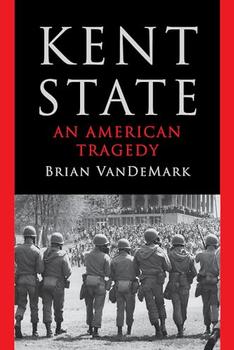Summary | Excerpt | Reviews | Beyond the Book | Readalikes | Genres & Themes | Author Bio

An American Tragedy
by Brian VanDeMark
Three weeks later, I traveled to his home in Wooster, Ohio. A part of me feared that he would change his mind at the last minute. My hopes lifted as I drove up and saw him standing in the street waiting for me. The autumn sky above him was heavy with cold clouds. He had a sad face and looked exhausted—not the kind of exhaustion that can be healed by a good night's sleep. His burden showed in the lines of his face as he led me into the living room of his modest ground-floor apartment and took an easy chair opposite me, his hands on the chair arms. His wife sat on a sofa between us. There was something enormous moving through the air of that room. As I placed my tape recorder on the coffee table, he gave me a brief, measuring look. He unfolded and refolded his hands, not wary of me but being careful. I sensed how rigid with tension his body was. I could feel him thinking, and I didn't want to interrupt. He was gearing up toward something big. He took his time before he finally started to talk.
As the interview got under way, he slowly loosened up. His initial reserve and bodily tension gradually fell away. For the next two and a half hours, he unburdened himself completely about Kent State for the first time, narrating his way to the very soul of his regret. Much of the time he looked at me, but his haunted eyes never quite met mine. His mouth quivered often and grief stirred under his voice. Occasionally he cast his eyes at the floor or stared out the window, concentrating on something only he could see, shut away in a private world of thought. Waves of sadness crossed his face. He never dreamed that his action might not do what it was intended to do; that his fellow guardsmen might not react the way he anticipated; that with good intentions he could set in motion a terrible tragedy. But there was no undoing what happened, no fixing it or explaining it away. I wondered how many times he had rerun that day in his head. The pain in his voice went so deep that I had to force myself not to look away. It was a long-postponed catharsis, painful but purgative. Deep down, a part of him felt relieved at last. But I couldn't tell which one was strongest: the relief or the shame. It wasn't over and done with; it was never going to be over and done with for him.
Much of what Matt McManus told me was unexpected. Yet it fit the known facts and was crucial to understanding how and why the shooting happened. Things that had baffled people for years suddenly made perfect sense. It also laid to rest many myths surrounding the events at Kent State. It was as if things suddenly rearranged themselves and clicked neatly into place, making visible what had been obscured for so long.
I thought of the victims and their families. They needed to know, to understand; cause and effect isn't a luxury. When we can't see a reason, we make assumptions and force facts into preconceived patterns until a reason takes shape because we want to find sense in the senseless. It is a reminder that reality is tumultuous, disordered, and unpredictable and that learning the truth can be devastating.
On May 4, 1970, on the campus of Kent State University in northeastern Ohio, the cultural and political crosscurrents that had been building in the United States for years reached critical mass. One group of young Americans, student protestors wearing bell-bottom pants and many with long hair, hurled epithets and rocks at another group of young Americans, National Guardsmen wearing helmets and gas masks and armed with rifles. About half past noon, a spasm of violence unfolded with chaotic speed as the National Guardsmen opened fire on the protestors.
This was the day the Vietnam War came home and the sixties came to an end. American soldiers shot American students on American soil. The Kent State shooting was a shocking event that dramatized the tension of social conflict, the theater of confrontation, the poignancy of life and death, and the horror of pure chance, revealing the choices individuals make, those that are made for them by others, and their lifelong ramifications.
Reprinted from Kent State: An American Tragedy by Brian VanDeMark. Copyright © 2024 by Brian VanDeMark. Used with permission of the publisher, W. W. Norton & Company, Inc. All rights reserved.
All my major works have been written in prison...
Click Here to find out who said this, as well as discovering other famous literary quotes!
Your guide toexceptional books
BookBrowse seeks out and recommends the best in contemporary fiction and nonfiction—books that not only engage and entertain but also deepen our understanding of ourselves and the world around us.